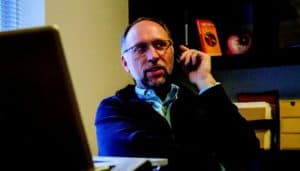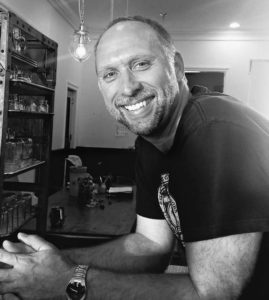What is the alternative to “fake news” or “alternative facts”? As a communicator, you could just decide to stick to one’s point of view, surrounding oneself with people who have similar opinions.Edward Roy, owner of a small film production company in Beacon, New York, tries to follow a different path: building trust by remaining faithful to the truth.
“It is so easy to alter the message of an interviewee — you just have to cut it and add another phrase,” says Roy. Doing so, you could completely twist their original meaning.
This filmmaker, though, would not alter any answers or try to force them in a redetermined direction. He wants to be faithful to the truth, and he finds that his clients value this attitude.
The Alternative: Trust
“I think our industry would not survive very long if we only produced fake news,” says the businessman in him. “It reminds me of the story of the young boy who cried ‘wolf,’ when there was no wolf, wanting to test if the people in the village would come to his aid. When one night a real wolf came and he cried out, nobody believed him, and nobody came to help.”
Many of his clients ask for promotional video clips. “Advertising has been very famous for provoking biased or emotional responses. Companies want to sell a product by connecting with the emotions of the target audience,” says Roy. There’s always the risk of crossing the line, he says, and “you run the danger of being sued if something in your ad can be proven wrong.”
Nowadays a lot of companies want to present themselves as caring and socially conscious, donating part of their income or resources to charities. “This too can lead to dishonest presentations of real outcomes: if a company donates a pair of shoes to a poor child for every pair bought in the stores, they show in their commercial children who before had to go barefoot, and are now happy with their new shoes. What they don’t show is that this practice greatly diminishes the demand for locally made shoes, impacting the livelihood of the shoe makers of those countries.”
Cutting out parts of a story can also be manipulating: showing only a part of the truth is not so far from telling a lie.
Does Roy ever feel the temptation to exaggerate to make a story more interesting? “My clients are pretty honest,” is his surprising answer.
It is a consequence of honest relationships he has tried to build over the years. So he doesn’t have to manipulate the truth in order to please his clients, but instead he discusses with them the quotes or images and how they can rearrange an interview and still remain faithful to the truth or intention of the interviewee.
On the other hand, every report, article, movie, or work of art is an interpretation of reality, no matter how objective the creator tries to be. Journalists, while not quite artists, still choose and compose their works.

That said, there are ways to stay truthful as much as possible. Roy mentions a documentary about St. Anthony of Padua that he made three years ago. “There were no witnesses, and no one knows what was true and what’s legend,” he says. He got a historian involved, but understood that he also needed to find a way to communicate why the life of this saint still matters today. “My work is not only informational but inspirational.”
“Every storyteller has their perspective; it is important that I don’t force a perspective on viewers or manipulate the facts,” says Roy, “but I still need to find an underlining truth that is convincing and then clearly communicate it.”
“Be aware of your own biases,” is a motto he chose for his work. “We often live in a bubble in our polarized society. So we constantly reaffirm our own biases. We don’t want to believe in stories outside our bubble,” he explains. He for one tries to make the effort to listen to other channels and set aside his own myopia.
For him, fake news is linked to money and power. “I see a cultural shift: these days, as long as people are making money or gaining power, everything is okay,” he says.
Traditional values like honesty are left behind, as long as one gets away with the deal they wanted. “That’s very disturbing to me,” he admits. When confronted with news that might have been manipulated, Roy questions it and tries to look up the source.
Social media does not help us understand the bigger picture: “We get a lot of fragmented pieces of information on the internet; although we feel connected to the world, often we don’t know the neighbor across the street.”
“Being truthful is very important to me,” says Roy. And the people who work with him treasure this too, be it rooted in their faith tradition or in a deep human conviction. Contrary to what one might think, there are many more people out there whose values don’t allow for altering the truth and seeking their own advantage.
“People want to make the world a better place. That’s not antiquated; it’s real,” Roy said.





